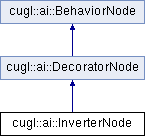 |
CUGL 1.2
Cornell University Game Library
|
 |
CUGL 1.2
Cornell University Game Library
|
#include <CUInverterNode.h>

Public Member Functions | |
| InverterNode () | |
| ~InverterNode () | |
| virtual void | query (float dt) override |
 Public Member Functions inherited from cugl::ai::DecoratorNode Public Member Functions inherited from cugl::ai::DecoratorNode | |
| DecoratorNode () | |
| ~DecoratorNode () | |
| const BehaviorNode * | getChild () const |
| template<typename T > | |
| const T * | getChild () const |
| virtual BehaviorNode::State | update (float dt) override |
 Public Member Functions inherited from cugl::ai::BehaviorNode Public Member Functions inherited from cugl::ai::BehaviorNode | |
| BehaviorNode () | |
| ~BehaviorNode () | |
| bool | init (const std::string &name) |
| virtual void | dispose () |
| const std::string & | getName () const |
| float | getPriority () const |
| BehaviorNode::State | getState () const |
| virtual void | setState (BehaviorNode::State state) |
| std::function< float()> | getPrioritizer () const |
| void | setPrioritizer (const std::function< float()> &func) |
| virtual std::string | toString (bool verbose=false) const |
| operator std::string () const | |
| const BehaviorNode * | getParent () const |
| void | setParent (BehaviorNode *parent) |
| void | removeFromParent () |
| int | getParentalOffset () const |
| size_t | getChildCount () const |
| std::vector< const BehaviorNode * > | getChildren () const |
| const BehaviorNode * | getChild (Uint32 pos) const |
| template<typename T > | |
| const T * | getChild (Uint32 pos) const |
| const BehaviorNode * | getNodeByName (const std::string &name) const |
| const BehaviorNode * | getNodeByName (const char *name) const |
| template<typename T > | |
| const T * | getNodeByName (const std::string &name) const |
| template<typename T > | |
| const T * | getNodeByName (const char *name) const |
| virtual void | reset () |
| virtual void | pause () |
| virtual void | resume () |
| virtual void | preempt () |
| virtual void | start () |
| void | setPriority (float priority) |
| std::shared_ptr< BehaviorNode > | removeChild (Uint32 pos) |
| void | addChild (const std::shared_ptr< BehaviorNode > child) |
Additional Inherited Members | |
 Public Types inherited from cugl::ai::BehaviorNode Public Types inherited from cugl::ai::BehaviorNode | |
| enum | State : unsigned int { State::INACTIVE = 0, State::RUNNING = 1, State::PAUSED = 2, State::FINISHED = 3 } |
 Static Public Member Functions inherited from cugl::ai::BehaviorNode Static Public Member Functions inherited from cugl::ai::BehaviorNode | |
| static bool | compareSiblings (const std::shared_ptr< BehaviorNode > &a, const std::shared_ptr< BehaviorNode > &b) |
 Protected Attributes inherited from cugl::ai::BehaviorNode Protected Attributes inherited from cugl::ai::BehaviorNode | |
| std::string | _name |
| std::string | _classname |
| BehaviorNode * | _parent |
| BehaviorNode::State | _state |
| float | _priority |
| std::function< float()> | _prioritizer |
| std::vector< std::shared_ptr< BehaviorNode > > | _children |
| int | _activeChild |
| int | _childOffset |
A class providing an inverter decorator node for a behavior tree.
An inverter node is a decorator node that sets its priority value equal to the opposite of its child's priority. As the priority values for behavior tree nodes are between 0 to 1, the priority of this node is 1 - the child's priority value.
An inverter node's state is directly based on its child's state. When an inverter node starts, it immediately starts its child. When the child finishes execution, the inverter node also finishes execution.
|
inline |
Creates an uninitialized inverter node.
You should never call this constructor directly. Instead, you should allocate a node with the BehaviorManager instance.
|
inline |
Deletes this node, disposing all resources.
|
overridevirtual |
Updates the priority value(s) for this node.
This method recursively determines the priority of this node and all of its children. The priority may be determined by a user-provided priority function or by the default priority function of the class.
When this method is complete, it will chose a child node to run, but will not run it. Unlike update, this method is guaranteed to run every time step in BehaviorManager, provided that the root node is running.
| dt | The elapsed time since the last frame. |
Reimplemented from cugl::ai::DecoratorNode.
 1.8.10
1.8.10